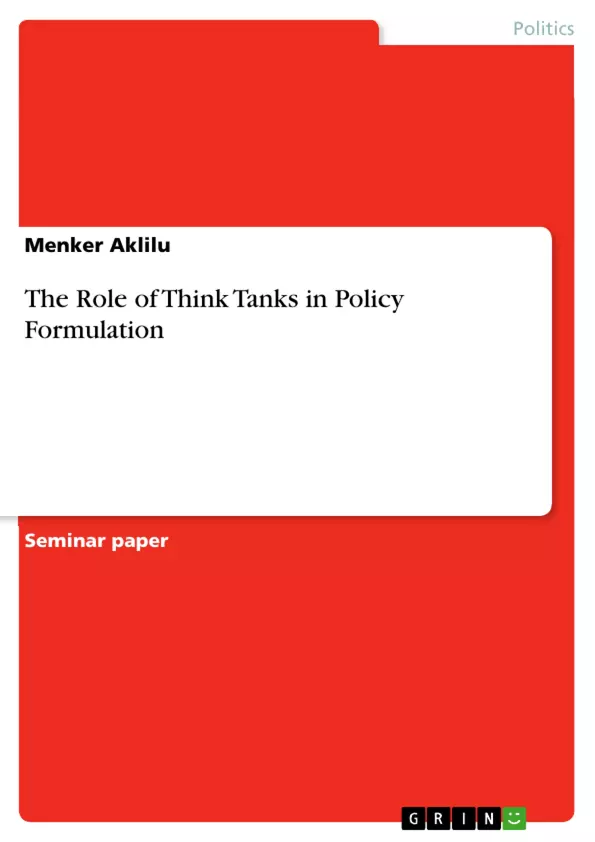The role of think tanks in the process of policy formulation is attempted to be presented in this term paper. The policy formation phase of the policy process is deemed crucial and encompasses various topics. The policy formulation process entails the involvement of many actors, stakeholders, and experts at different levels and degrees of engagement.
Public-policy research, analysis, and engagement groups known as think tanks are utilized to produce policy-oriented research, guidance, and analysis on national and international topics, enabling decision-makers and the general public to make well-informed choices regarding public policy. The conceptual definition of policy formulation, concepts of think tanks, and different classifications of think tanks are covered in this paper through the revision of explanations and descriptions provided by scholars. Additionally, the history of think tanks is discussed in this section, with a critical examination of its beginnings.
In the subsequent stage, the role of think tanks in policy formulation is explored by examining various pieces of literature addressing the issue. Furthermore, an attempt is made to investigate the contributions of think tanks in China, the USA, and Ghana. Finally, an assessment of the situation in Ethiopia is conducted by considering articles written on the issue
Inhaltsverzeichnis (Table of Contents)
- Introduction
- Defining Think Tank
- Types of Think Tanks
- Politically Affiliated Think Tank
- Thematic Think Thanks
- Think and do Think Thanks
- The History of Think Tanks
- The role of Think Tanks in Policy-Making Process
- Problem Definition and Agenda Setting
- Policy Formulation
- Policy Legitimation
- Policy Implementation
- Policy Evaluation and Policy Change
- Leadership and Think Thanks
- 2020 Think Tank Statistics
- Global Distribution of Think Tanks by Region and Number of Think Tanks in the World. 2020
- Countries with the Largest Number of Think Tanks
- Think Tanks in China
- Think Tanks in USA
- Think Tanks in Ghana
- Think Thanks in Ethiopia
- Summary
- Reference
Zielsetzung und Themenschwerpunkte (Objectives and Key Themes)
This paper examines the role of think tanks in policy formulation. It explores the concept of think tanks, their different classifications, and their historical development. The paper then delves into the specific contributions of think tanks in the policy-making process, analyzing their influence on problem definition, agenda setting, policy formulation, legitimation, implementation, evaluation, and policy change. The paper further explores the activities of think tanks in various countries, including China, the USA, Ghana, and Ethiopia.
- The role of think tanks in the policy formulation process
- Different types and classifications of think tanks
- The history and development of think tanks
- The impact of think tanks on various stages of the policy-making process
- The activities of think tanks in different countries
Zusammenfassung der Kapitel (Chapter Summaries)
The introduction of the paper establishes the focus on the role of think tanks in policy formulation. It emphasizes the crucial nature of the policy formation phase and highlights the involvement of various stakeholders, including think tanks, in this process.
Chapter 2 defines think tanks as public-policy research analysis and engagement organizations that generate policy-oriented research and advice, thereby enabling policymakers and the public to make informed decisions. The chapter clarifies that think tanks are independent organizations with a defined structure that bridge the gap between academic and policymaking communities.
Chapter 3 delves into the different types of think tanks, exploring their classifications based on political affiliation, thematic focus, and their approach to policy engagement. This chapter provides a nuanced understanding of the diverse roles and activities of think tanks.
Chapter 4 traces the history of think tanks, examining their origins and evolution over time. This historical perspective provides context for the current role and significance of think tanks in the policy-making landscape.
Chapter 5 explores the role of think tanks in the policy-making process. The chapter discusses how think tanks contribute to problem definition, agenda setting, policy formulation, legitimation, implementation, evaluation, and policy change.
Chapter 6 examines the relationship between leadership and think tanks. This chapter may delve into the influence of think tanks on leadership decisions and the role of leadership in shaping the direction of think tank activities.
Chapter 7 presents statistics on the global distribution of think tanks, highlighting the regional concentration and overall number of think tanks worldwide.
Chapter 8 focuses on the activities of think tanks in China, providing insights into their influence on policy-making in that country. This chapter may discuss specific examples of think tanks and their impact on Chinese policy.
Chapter 9 examines the role of think tanks in the United States, discussing their impact on American policy-making. This chapter may explore the diverse range of think tanks operating in the USA and their specific areas of expertise.
Chapter 10 delves into the activities of think tanks in Ghana, providing a regional perspective on their influence on policy-making. This chapter may explore the specific challenges and opportunities faced by think tanks in Ghana.
Schlüsselwörter (Keywords)
Think tanks, policy formulation, policy-making process, public-policy research, engagement groups, agenda setting, problem definition, policy legitimation, implementation, evaluation, policy change, global distribution, China, USA, Ghana, Ethiopia.
- Quote paper
- Menker Aklilu (Author), 2023, The Role of Think Tanks in Policy Formulation, Munich, GRIN Verlag, https://www.grin.com/document/1436213



